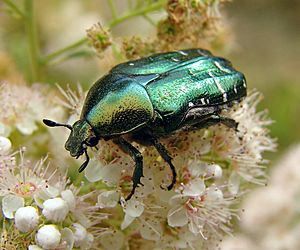Polyphaga facts for kids
Quick facts for kids Polyphaga |
|
|---|---|
 |
|
| Cetonia aurata | |
| Scientific classification |
|
| Kingdom: | Animalia |
| Phylum: | Arthropoda |
| Class: | Insecta |
| Order: | Coleoptera |
| Suborder: | Polyphaga Emery, 1886 |
| Infraorders | |
|
Bostrichiformia |
|
The Polyphaga is the biggest and most varied group of beetles. It is a suborder, which is a way scientists group living things. Its name comes from two Greek words: poly, meaning 'many', and phagein, meaning 'to eat'. So, Polyphaga means 'eaters of many things'.
This group includes 144 families and 16 superfamilies. It shows a huge range of ways beetles have adapted to different environments. There are over 315,000 known species in Polyphaga. That's about 90% of all beetle species ever found!
Contents
Types of Polyphaga Beetles
Scientists divide Polyphaga into five main groups, called infraorders. Each group includes different kinds of beetles.
Bostrichiformia
This group includes beetles like furniture beetles and skin beetles. Furniture beetles can sometimes damage wood. Skin beetles often eat dry animal materials.
Cucujiformia
This is a very large group. It has many well-known beetles such as lady beetles, longhorn beetles, and weevils. Other beetles in this group are checkered beetles and leaf beetles.
Most beetles in the Cucujiformia group are phytophagous. This means they eat plants. Eating plants helped these beetles create many new species and become very diverse. A lot of this change happened at the same time that flowering plants were evolving. About 99% of plant-eating beetles feed on flowering plants.
Elateriformia
This group includes interesting beetles like click beetles and fireflies. Click beetles can flip themselves into the air with a "click" sound. Fireflies are famous for their glowing lights.
Scarabaeiformia
This group contains scarab beetles and stag beetles. Scarab beetles are known for rolling balls of dung. Stag beetles have large, antler-like jaws.
Staphyliniformia
This group includes rove beetles and water scavenger beetles. Rove beetles are often found in damp places. Water scavenger beetles live in water and help clean it.
See also
 In Spanish: Polyphaga para niños
In Spanish: Polyphaga para niños
 | Misty Copeland |
 | Raven Wilkinson |
 | Debra Austin |
 | Aesha Ash |

